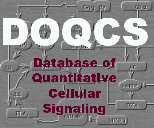
|
Enter a Search String | | Special character and space not allowed in the query term.
Search string should be at least 2 characters long. |
Molecule Parameter List for MAPK-tyr | The statistics table lists the distribution of a molecule acting either as a substrate, product, enzyme or as a molecule within the network.
The text color of a molecule is highlighted by  color. color. | | Statistics |
Accession and Pathway Details | |
| Accession Name | Accession No. | Accession Type | Pathway Link | Ajay_Bhalla_
2004_PKM_MKP3_
Tuning | 77 | Network |
Shared_Object_Ajay_Bhalla_2004_PKM_MKP3_Tuning, PKC, PLA2,
PLCbeta, Ras, Gq,
MAPK, EGFR, Sos,
PLC_g, CaMKII, CaM,
PP1, PP2B, PKA,
AC, MKP3, PKM | | This model is based on Ajay SM, Bhalla US. Eur J Neurosci. 2004 Nov;20(10):2671-80. This is the feedforward model with MPK3 from figure 8a. |
MAPK-tyr acting as a Molecule in Ajay_Bhalla_2004_PKM_MKP3_Tuning Network
| Name | Accession Name | Pathway Name | Initial Conc.
(uM) | Volume
(fL) | Buffered | | MAPK-tyr | Ajay_Bhalla_
2004_PKM_MKP3_
Tuning
Accession No. : 77 | MAPK
Pathway No. : 335 | 0 | 1.5 | No | | Haystead et al FEBS Lett. 306(1) pp 17-22 show that phosphorylation is strictly sequential, first tyr185 then thr183. |
MAPK-tyr acting as a Substrate for an Enzyme in Ajay_Bhalla_2004_PKM_MKP3_Tuning Network
| | Enzyme Molecule /
Enzyme Activity | Accession Name | Pathway Name | Km (uM) | kcat (s^-1) | Ratio | Enzyme Type | Reagents | | 1 | MAPKK* /
MAPKKthr | Ajay_Bhalla_
2004_PKM_MKP3_
Tuning
Accession No. : 77 | MAPK
Pathway No. : 335 | 0.0462963 | 0.3 | 4 | explicit E-S complex | Substrate
MAPK-tyr
Product
MAPK*
| | | Rate consts same as for MAPKKtyr. | | 2 | MKP-3 /
MKP3-tyr-deph | Ajay_Bhalla_
2004_PKM_MKP3_
Tuning
Accession No. : 77 | MKP3
Pathway No. : 345 | 10.0001 | 4 | 4 | explicit E-S complex | Substrate
MAPK-tyr
Product
MAPK
| | | The original kinetics have been modified to obey the k2 = 4 * k3 rule, while keeping kcat and Km fixed. As noted in the NOTES, the only constraining data point is the time course of MAPK dephosphorylation, which this model satisfies. It would be nice to have more accurate estimates of rate consts and MKP-1 levels from the literature. Effective Km : 67 nM kcat = 1.43 umol/min/mg Km for MKP3 is set to 267 nM, twice as high as MKP1 version, to lessen substrate saturation. |
MAPK-tyr acting as a Product of an Enzyme in Ajay_Bhalla_2004_PKM_MKP3_Tuning Network
| | Enzyme Molecule /
Enzyme Activity | Accession Name | Pathway Name | Km (uM) | kcat (s^-1) | Ratio | Enzyme Type | Reagents | | 1 | MAPKK* /
MAPKKtyr | Ajay_Bhalla_
2004_PKM_MKP3_
Tuning
Accession No. : 77 | MAPK
Pathway No. : 335 | 0.0462963 | 0.3 | 4 | explicit E-S complex | Substrate
MAPK
Product
MAPK-tyr
| | | The actual MAPKK is 2 forms from Seger et al JBC 267:20 14373(1992) Vmax = 150nmol/min/mg From Haystead et al FEBS 306(1):17-22 we get Km=46.6nM for at least one of the phosphs. Putting these together: k3=0.15/sec, scale to get k2=0.6. k1=0.75/46.6nM=2.7e-5 | | 2 | MKP-3 /
MKP3-thr-deph | Ajay_Bhalla_
2004_PKM_MKP3_
Tuning
Accession No. : 77 | MKP3
Pathway No. : 345 | 10.0001 | 4 | 4 | explicit E-S complex | Substrate
MAPK*
Product
MAPK-tyr
| | | See MKP1-tyr-deph Km is twice as high to avoid saturation. |
| Database compilation and code copyright (C) 2022, Upinder S. Bhalla and NCBS/TIFR
This Copyright is applied to ensure that the contents of this database remain freely available. Please see FAQ for details. |
|
